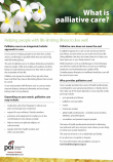Free shipping from £30! Cancer and How To Manage Them. Introducing advance care planning Be sensitive – some people may not want to talk about or have an advance care plan.

Check whether the person already has an advance care plan in place. Remember that everyone is different – their wish for knowledge, autonomy and control will vary. This guide will help people to understand how advance care planning offers people the opportunity to plan their future care and support, including medical treatment, while they have the capacity to do so. Not everyone will want to make an advance care plan , but it may be especially relevant for: People at risk of losing mental capacity – for example, through progressive illness. Planning your care in advance might: make it more likely that other people understand what’s important to you make it more likely that you’ll get the care that you want make things easier for your family.
What does advance care planning mean? Advance Care Planning Dashboard Layout 1. What are the benefits of advance care planning? What is advance care planning (ACP)?

An advance care plan describes what is important to you as well as the healthcare and treatments you want. You and your healthcare team can work together to make an advance care plan. This plan will help the healthcare team caring for you, and your wh! Order fragrances, make-up and skin care on account. Thinking and talking about end-of-life issues can be difficult, and putting documents in place can seem daunting.
That’s why we have developed this advance planning guide. It gives you an opportunity to think about, talk about and write down your preferences and priorities for your future care , including how you want to receive your care towards the end of your life. Anything can be included. ACP is a series of voluntary conversations that allow you to discuss, reflect and decide on the type of healthcare treatments you may or may not want. This can include treatments you do not want to have.
The choice is yours as to who you share the information with. It provides a guide to help healthcare professionals and anyone else who might have to make decisions about your care if you become too unwell, to make decisions or to communicate them. An advance directive is a guide that only covers certain important health care issues. Your wishes expressed in an advanced directive will need to be put into medical orders once you are determined to lack the capacity to make your own health decisions.
During this discussion you may choose to express some views, preferences and wishes about your future care. There are blank templates and a couple of short completed ones to help you. The forms are not designed to all be filled in at once. This has implications for its acceptability to patients. It is focused on the individual and involves both the person and the health care professionals responsible for their care.
Easy-read summary of the toolkit An easy to read guide to making a will An example from Ireland about will making, designed for people with intellectual disability. When a patient expresses a desire for advance care planning , the nurse can communicate the request to the healthcare team. The Guide is organized into sections.
Additional sections on other topic areas will be added in the future.
No comments:
Post a Comment
Note: only a member of this blog may post a comment.